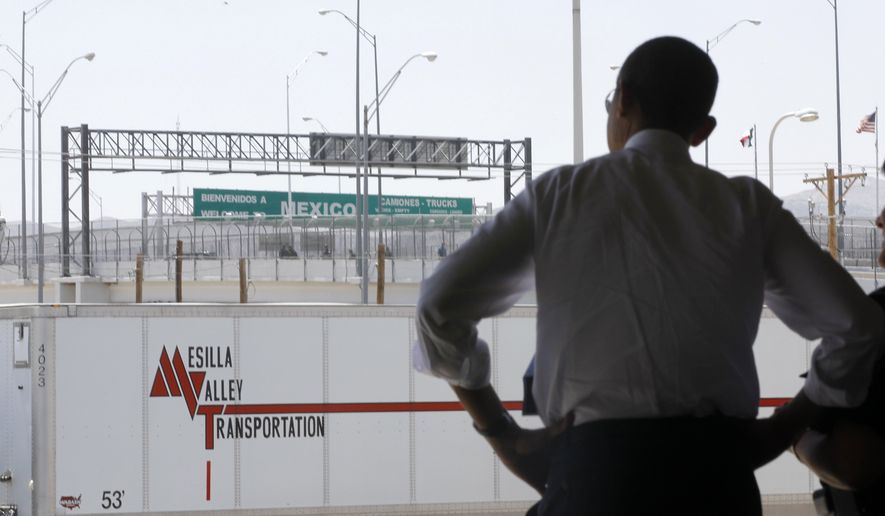The House voted Thursday to add its voice to the Supreme Court case seeking to stop the administration’s deportation amnesty, escalating the stakes as Republicans beg the justices to set limits on President Obama’s expansive claims of executive power.
Speaker Paul D. Ryan, Wisconsin Republican, pushed the vote, saying the entire House should go on record to defend Congress’ right to make laws and the president’s more limited role in enforcing them.
“This is not a question of whether or not we are for or against any certain policy. Members who are making immigration policy arguments are missing the point here. This comes down to a much more fundamental question. It is about the integrity of our Constitution,” Mr. Ryan said.
Republicans have accused Mr. Obama of usurping Congress’ powers on environmental laws, Obamacare and other issues, but none is as heated as immigration. The president has claimed discretionary powers to stop enforcing laws against most illegal immigrants.
Democrats said Thursday’s vote had little to do with big constitutional questions and was instead a partisan attack on Mr. Obama and an attempt to punish illegal immigrants.
“You want to see people deported. Why don’t you stand up and say it?” said Rep. Luis V. Gutierrez, Illinois Democrat, who has vowed to make Republicans pay on Election Day for refusing to legalize illegal immigrants.
Democrats also said they didn’t know what the House brief would say, so it was unfair to ask them to vote to approve filing it.
Mr. Ryan prevailed in a 234-181 vote, but it wasn’t pretty. All Democrats in the chamber opposed his move, as did five Republicans, signaling the deep divisions on the immigration issue on Capitol Hill.
The vote gives Mr. Ryan the power to file an amicus brief with the Supreme Court supporting Texas and more than two dozen other states that have sued to stop Mr. Obama’s amnesty.
Announced in November 2014, the policy would grant as many as 5 million illegal immigrants a three-year stay of deportation, award them work permits and make them eligible for some taxpayer-funded benefits.
A district court in Texas, and then a federal appeals court based in New Orleans, have ruled against Mr. Obama and blocked the amnesty. The Supreme Court this year agreed to take the case and speed it through the docket to decide before the end of Mr. Obama’s presidency.
The justices made clear that they are interested in settling not just the specifics of this case, but also the bigger questions about Mr. Obama’s claims of executive power. They asked both sides to submit briefs on whether he is flouting the Constitution’s clause directing that he make sure the laws are “faithfully executed” as written.
Mr. Ryan could have had the House join the lawsuit even without the vote, but he said he wanted to put all members on record on the broader issues of presidential actions and congressional power.
Mr. Obama has made his own case more difficult by contradicting himself on the extent of his powers.
For the first five years of his tenure, the president repeatedly said he didn’t have the authority to grant “deferred action” to a broad swath of illegal immigrants, disappointing immigrant rights advocates who insisted he did have the power. After Democrats suffered devastating defeats in the 2014 congressional elections, Mr. Obama reversed himself and said he did have those powers.
Immediately after announcing his policies, Mr. Obama said he had taken “action to change the law.”
Republicans seized on that remark as evidence that the president went beyond his powers and assumed the job of Congress.
The state of Texas is taking the lead in the immigration case, and the House’s involvement will be limited to its friend-of-the-court brief. But the House is leading another legal challenge to Mr. Obama over his signature Affordable Care Act.
Lawmakers said they withheld funding for part of the health care law, but Mr. Obama moved money among accounts to pay for it, violating Congress’ power of the purse. A judge has delivered an early victory to the House, saying it has standing to sue.
The immigration fight, meanwhile, has become ensnared in election-year politics. Democrats said Republicans are following the lead of their party’s presidential front-runner, Donald Trump, who has made immigration enforcement a major part of his campaign.
Republicans said Democrats who seem so intent on granting legal status to illegal immigrants could have done so in 2009 or 2010, when they controlled the White House and both chambers of Congress. Instead, they delayed, leaving Mr. Obama to try an end-run around Capitol Hill.
Rep. Trey Gowdy, South Carolina Republican, said Democrats may regret the precedent they are trying to set. He said a Republican president could claim the same expansive powers to stop enforcement of other laws.
“Be careful what you do today. Tomorrow is coming,” Mr. Gowdy said.
• Stephen Dinan can be reached at sdinan@washingtontimes.com.




Please read our comment policy before commenting.